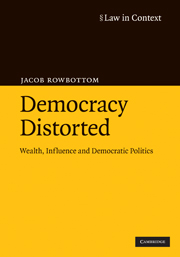Book contents
- Frontmatter
- Contents
- Preface and acknowledgements
- 1 Political equality, wealth and democracy
- 2 Freedom to speak and freedom to spend
- 3 Strategies and reforms
- 4 Access, influence and lobbying
- 5 Beyond equal votes: election campaigns and political parties
- 6 Public spaces, property and participation
- 7 The mass media: democratic dreams and private propagandists
- 8 Participation in the digital era: a new distribution?
- 9 Conclusion
- Index
9 - Conclusion
Published online by Cambridge University Press: 05 June 2012
- Frontmatter
- Contents
- Preface and acknowledgements
- 1 Political equality, wealth and democracy
- 2 Freedom to speak and freedom to spend
- 3 Strategies and reforms
- 4 Access, influence and lobbying
- 5 Beyond equal votes: election campaigns and political parties
- 6 Public spaces, property and participation
- 7 The mass media: democratic dreams and private propagandists
- 8 Participation in the digital era: a new distribution?
- 9 Conclusion
- Index
Summary
Political equality is a central principle in a democracy. It is a principle that runs through the different stages of the political process. Yet it is compromised when opportunities to influence political decisions are secured through a person's wealth. The unequal distribution of wealth in the economic sphere stands in contrast to the democratic ideal that people have the same opportunities to participate and influence decisions. As the previous chapters have shown, the potential for inequalities in wealth to enter the political sphere arises at various points. These points include the funding of political parties, the channels for influencing MPs and ministers, and in the opportunities to communicate with the public.
The impact of the inequalities in wealth in politics has not gone unchecked and is subject to a number of legal restraints. Controls on election spending have been in place since 1883, and laws of corruption and the various codes of conduct have prevented influence being bought. Furthermore, large sums of money are not essential for many forms of participation. Yet the tension between political equality and inequalities in wealth remains. That tension is also heightened, not as a result of any conspiracy or deliberate design, but as a result of the separate trends discussed in earlier chapters. Chapter 4 discussed the growth of professional lobbying techniques, which offer more capital-intensive methods to influence MPs, ministers and civil servants, and potentially increase the costs associated with certain political activities.
- Type
- Chapter
- Information
- Democracy DistortedWealth, Influence and Democratic Politics, pp. 245 - 248Publisher: Cambridge University PressPrint publication year: 2010

